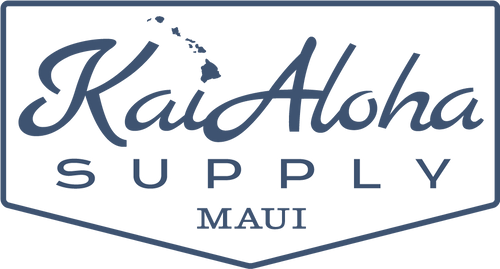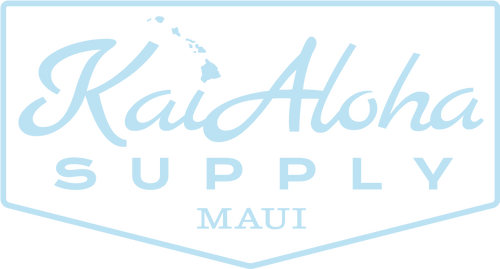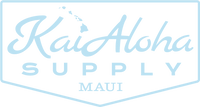It’s deeper than the sea– KaiAloha Supply supports Maui Nui Marine Resource Council’s reef preservation and ocean water testing
KaiAloha Supply is a proud corporate sponsor of Maui Nui Marine Resource Council (MNMRC), whose mission is to conserve the environment, particularly by protecting our oceans, sea creatures, and coral reefs. Jill Wirt, the senior project manager at Maui Nui Marine Resource Council, explained that only 8-9% of plastics actually get recycled while the majority ends up in landfills. The recycling symbol, which consists of three arrows, represents the impact of our actions on the environment. This not only affects marine life, but also harms the quality of ocean water, and consequently, water-related activities like surfing, swimming, and boating.
MNMRC is an environmental non-profit organization established in 2007 and has been actively promoting community-driven efforts to safeguard marine resources. They work towards ensuring clean ocean water, fostering healthy coral reefs, and preserving the abundance of native fish. Their ongoing projects, which are geared towards identifying and enhancing water quality, while also encouraging a more eco-friendly lifestyle, include initiatives such as oyster restoration, water testing programs, and reef-friendly landscaping.
"We can't do it without our partners either, we want to thank KaiAloha Supply for their donation to us last year and again this year," Wirt said.
MNMRC works with their sister organization, Hui O Ka Wai Ola, to carry out their oyster restoration project in Mā’alaea Bay. They have safely placed 10,000 oysters in cages along Maui’s coastline, to enhance the quality of ocean water in that area. The project was initiated when they discovered that the coastal water quality was deteriorating due to the influx of storm water, sediment runoff, and other pollutants from the land, which was adversely affecting coral reef health, sea turtle feeding grounds and even water recreation activities. “A single grown adult oyster can filter 50-60 gallons of water in a day,” Wirt said. Oysters are known to be the most efficient natural water filters, as they consume huge amounts of water and in the process, capture sediment and pollutants from the water column. The goal of this project is to take advantage of the oyster's natural filtration properties to improve the water quality of Mā’alaea Bay and increase sunlight penetration for the growth and health of corals and sea creatures.

The photo above shows one out of the many oyster cages that are placed along the coast of Maui. MNMRC and Hui O Ka Wai Ola have developed an “Adopt-An-Oyster” program that supports the oysters they currently have and allows them to continue this successful project. It costs $7 to adopt an oyster. Click here for more information. (Courtesy of Maui Nui Marine Resource Council)
MNMRC not only relies on the natural filtration process of oysters, but the organization runs a testing program spearheaded by Hui O Ka Wai Ola. This program involves community volunteers who assess the quality of ocean water every three weeks at 29 different locations in West and South Maui. Their evaluation is based on the degree of clarity or turbidity in the water, which is determined by the amount of sediment stirred up. The water and nutrient samples are then sent to laboratories in Lahaina and South Maui for a thorough analysis. Through this process, they are able to provide reliable data to county, state, and federal agencies that monitor and address changes in water quality that can have a negative impact on coral reefs.

A volunteer brings a water sample out of the testing site at Keālia Pond. Our KaiAloha Supply team was able to join Hui O Ka Wai Ola on sampling sites to Mā’alaea Harbor, Mā’alaea Condos, Haycraft Park, Keālia Pond, and Kihei Canoe Club in November 2022. (KaiAloha Supply / Kassidy Kievit)

The clipboard shows results from water samples taken in their team's mobile lab. The morning of November 17, 2022, the Hui team was able to collect data points on water temperature, oxygen, pH levels, salinity, and turbidity. (KaiAloha Supply / Kassidy Kievit)
Their objective is to establish a seamless connection from top to bottom, initiating collaborations with a range of entities, such as county, state, federal, other non-profits, and consultants. "We can't do it without our partners either, we want to thank you for your donation to us last year and again this year," Wirt said.
The Pohakea watershed project has implemented various measures to reduce erosion and prevent sediment runoff into the bay and harbor. They have planted vetiver grass, which has deep roots to anchor the soil, and created fire breaks to reduce the risk of fires and minimize sediment erosion. The Kihei project, on the other hand, involves establishing deer fences and implementing various restoration projects like wetland restoration, invasive species removal, and native planting. Locally, the team runs a reef-friendly landscaping program that encourages hotels, resorts, and golf courses to use fewer synthetic fertilizers, pesticides, and herbicides. They also urge homeowners to use chemicals responsibly by diluting them properly, storing them correctly, and avoiding overuse.
MNMRC hosts a monthly speaker series called "Know Your Ocean" on the first Wednesday of each month via Zoom. The series features various experts who discuss ocean-related topics such as whales, sharks, animal entanglements, and reef-friendly landscaping. The organization is also developing a volunteer program. According to Jill, there are many exciting projects to participate in on Maui. However, she also encourages people worldwide to engage in beach cleanups, reduce their consumption and support local farmers, as well as foster stronger community ties with their neighbors.
“That’s what I think makes Hawai'i so unique, is you feel very connected to the natural processes here and your actions do have an impact,” Wirt said. Similar to the recycling symbol, the three arrows represent a series of events that impact our ecosystem and way of life. Though immediate solutions may not be readily available, there are measures that can lead us in the right direction. The three arrows signify not only recycling, but also a collective effort to effect change in our communities, globally, and as a movement of ocean enthusiasts.
To stay up to date with their events, visit their Instagram.
To learn more about Maui Nui Marine Resource Council, visit https://www.mauireefs.org/.



